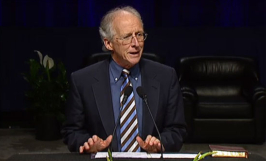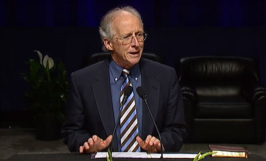
Pastor John Piper believes it is wrong for Christians to play the lottery, which has become a $70-billion industry in the United States.
The money Americans spend to play the lottery is reportedly even bigger than that spent on books, video games, movies, and sports. This is "a great shame on our nation," says Piper, the chancellor of the Minnesota-based Bethlehem College and Seminary.
On his Desiring God blog, Piper listed down seven reasons why Christians should not play the lottery:
1. It is spiritually suicidal.
The pastor cited the Bible verses 1 Timothy 6:9-10: "Those who desire to be rich fall into temptation, into a snare, into many senseless and harmful desires that plunge people into ruin and destruction... and pierced themselves with many pangs."
2. It is a kind of embezzlement.
Piper says all of people's money belongs to God, and they have no right to gamble with it. "Faithful trustees may not gamble with a trust fund," he says.
3. It's a fool's errand.
As tempting as the winnings might be, Piper still wants to remind people that the odds of winning are nearly 176 million-to-one. "You take real money and buy with it a chance. That chance is so infinitesimally small that the dollar is virtually lost. 175,999,999 times," he stresses. "The smaller amounts paid out more often are like a fog to keep you from seeing what is happening."
4. The system is built on the necessity of most people losing.
The lottery is another form of gambling that is rigged to make participants lose, says Piper.
5. It preys on the poor.
Poor people in the U.S., or those who earn $13,000 or less, actually spend 9 percent of their income on lottery tickets, Piper says, so the "harmless" game is actually a "deeply regressive tax."
6. There is a better alternative.
Those who believe that the lottery is a practical way to accumulate wealth are fools, according to Piper, and they should actually be more focused on making wise investments.
"If the $500 a year that on average all American households throw away on the lottery were invested in an index fund each year for 20 years, each family would have $24,000. Not maybe. Really," he says. "And the taxes on these earnings would not only support government services, but would be built on sound and sustainable habits of economic life."
7. For the sake of quick money, the government is undermining virtue without which it cannot survive.
Piper is against any government that "raises money by encouraging and exploiting the weaknesses of its citizens." By promoting the lottery, the government "undercuts" civic virtue.
Piper is so against the lottery that he told his congregation that if anyone of them lucks out in the lottery, they should not donate their winnings to their ministry. "Christ does not build his church on the backs of the poor. Pray that Christ's people will be so satisfied in Him that they will be freed from the greed that makes us crave to get rich," he says.


















